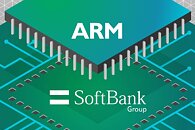Raevenlord
News Editor
- Joined
- Aug 12, 2016
- Messages
- 3,755 (1.18/day)
- Location
- Portugal
| System Name | The Ryzening |
|---|---|
| Processor | AMD Ryzen 9 5900X |
| Motherboard | MSI X570 MAG TOMAHAWK |
| Cooling | Lian Li Galahad 360mm AIO |
| Memory | 32 GB G.Skill Trident Z F4-3733 (4x 8 GB) |
| Video Card(s) | Gigabyte RTX 3070 Ti |
| Storage | Boot: Transcend MTE220S 2TB, Kintson A2000 1TB, Seagate Firewolf Pro 14 TB |
| Display(s) | Acer Nitro VG270UP (1440p 144 Hz IPS) |
| Case | Lian Li O11DX Dynamic White |
| Audio Device(s) | iFi Audio Zen DAC |
| Power Supply | Seasonic Focus+ 750 W |
| Mouse | Cooler Master Masterkeys Lite L |
| Keyboard | Cooler Master Masterkeys Lite L |
| Software | Windows 10 x64 |
Arm co-founder Hermann Hauser recently gave an interview to BBC where he expressed some concerns regarding the prospective buy acquisition from NVIDIA, which has been in talks with Arm owner Softbank towards the IP-designer's acquisition. As Hauser puts it, "It's one of the fundamental assumptions of the ARM business model that it can sell to everybody," Hauser told BCC, "The one saving grace about Softbank was that it wasn't a chip company, and retained ARM neutrality. If it becomes part of Nvidia, most of the licensees are competitors of Nvidia, and will of course then look for an alternative to ARM."
Hauser doesn't think the NVIDIA deal will follow through due to these aspects of the chip design ecosystem, with many Arm clients - such as Intel, Apple, Qualcomm, TSMC, Samsung, among others - being direct or otherwise indirect competitors to NVIDIA. Hauser thinks that Arm would be much better served through a British government intervention in bringing the company back towards the British fold: "The great opportunity that the cash needs of Softbank presents is to bring ARM back home and take it public, with the support of the British government." The Softbank acquisition occurred back in 2016 and cost the company some $24 billion; however, recent estimates from New Street Research LLP placed Arm's valuation at USD $44 billion if its IPO took off in 2021, and as much as $68 billion by 2025.


View at TechPowerUp Main Site
Hauser doesn't think the NVIDIA deal will follow through due to these aspects of the chip design ecosystem, with many Arm clients - such as Intel, Apple, Qualcomm, TSMC, Samsung, among others - being direct or otherwise indirect competitors to NVIDIA. Hauser thinks that Arm would be much better served through a British government intervention in bringing the company back towards the British fold: "The great opportunity that the cash needs of Softbank presents is to bring ARM back home and take it public, with the support of the British government." The Softbank acquisition occurred back in 2016 and cost the company some $24 billion; however, recent estimates from New Street Research LLP placed Arm's valuation at USD $44 billion if its IPO took off in 2021, and as much as $68 billion by 2025.


View at TechPowerUp Main Site





